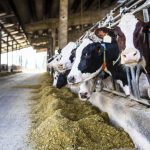Reuters – Twenty-four companies are working to develop an avian flu vaccine for cattle, as the virus spreads among U.S. dairy herds, Agriculture Secretary Tom Vilsack told Reuters on Wednesday. […] Read more
1.


Research collaboration studying interactions between farm practices and environment, wildlife and biosecurity to help fight highly pathogenic avian influenza

DNA Connect allows for adjustments through smartphone or tablet


Stopping and observing are the first steps to efficiency


Research finds hay can help in some conditions where cows already have acidosis or inflammation

‘We are still learning,’ says southwestern Ontario vet

